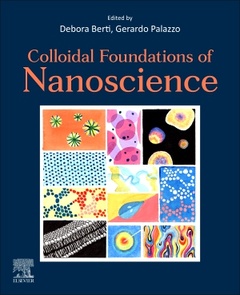Description
Colloidal Foundations of Nanoscience (2nd Ed.)
Coordinators: Berti Debora, Palazzo Gerardo
Language: English
Subject for Colloidal Foundations of Nanoscience:
Keywords
Colloids; Nanoscience; Nanotechnology; Diffusion; Electrokinetics; Rheology; Surfactants; Polymers; Nanoparticles
324 p. · 19x23.4 cm · Paperback
Description
/li>Contents
/li>Biography
/li>Comment
/li>
Colloidal Foundations of Nanoscience, Second Edition explores the theory and concepts of colloid chemistry and its applications to nanoscience and nanotechnology. The book provides the essential conceptual and methodological tools to approach nano-research issues. The authors? expertise in colloid science will contribute to the understanding of basic issues involved in research. Each chapter covers a classical subject of colloid science in simple and straightforward terms, addressing its relevance to nanoscience before introducing case studies. Sections cover colloids rheology, electrokinetics, nanoparticle tracking analysis (NTA), bio-layer interferometry, and the treatment of inter-particle interactions and colloidal stability.
2. Thermodynamics of (Nano)Interfaces
3. Nanoparticle Interactions: Factors Ruling Homo / Hetero Aggregation and Deposition
4. Bottom-Up Synthesis of Nanosized Objects
5. Polymers and Nanoscience
6. Surfactants and Nanoscience
7. Colloid Phase Behavior
8. Scattering of Radiation
9. Diffusion, Electrokinetics, and Aggregation
10. Diffusion Measuring Techniques
11. Rheology Primer for Nanoparticle Scientists
In 2000 she joined the University of Florence, where she teaches Physical Chemistry of Nanosystems and Colloid Chemistry in undergraduate courses. She is also member of the Board of PhD School in Chemical Sciences.
Her background in physical chemistry of surfactant self-assembly has gradually shifted throughout the years to self-assembly of bio-inspired and biorelevant functional amphiphiles, with particular focus on nucleolipids.
The structural and dynamic characterization of nucleolipidi self-assemblies have been her core research themes in the early stages of her scientific activity
Currently, her research topics include :
Nanostructured fluids for the Conservation of Cultural Heritage
Hybrid Nanoparticle/lipid assemblies for stimuli responsive drug delivery
Interaction of nanostructured assemblies with model membranes
She is author of more than 70 published or in press research papers.
She has been member of ECIS (European Colloid and Interface Society) since 2000, ACS, Italian Chemical Society, European Neutron Scattering Association, Italian Society for Neutron Scattering, IACIS.
She is the President Elect of the European Colloid and Interface Society.
Gerardo Palazzo graduated in Chemistry at University of Bari and obtained his PhD in “Applied Biochemistry and Chemistry at University of Molise. In 1989-1990 he was invited scientist at Institut für Polymere - Swiss Federal Institute of Technology (ETH) of Zürich (CH). In 1991 he joined the University of Bari where he is associate professor of Physical-Chemistry in the Department of Chemistry. Since 1991 his teaching subjects have been –colloid and interfaces-, t
- Gathers, in a single volume, information currently scattered across various sources
- Provides a straightforward introduction on theoretical concepts and in-depth case studies to help readers understand molecular mechanisms and master advanced techniques
- Includes examples showing the applications of classical concepts to real-world cutting-edge research
- Edited and written by highly respected quality scientists
These books may interest you

Surface and Colloid Science 189.89 €

Colloidal Suspension Rheology 46.39 €

Colloidal Organization 158.56 €

